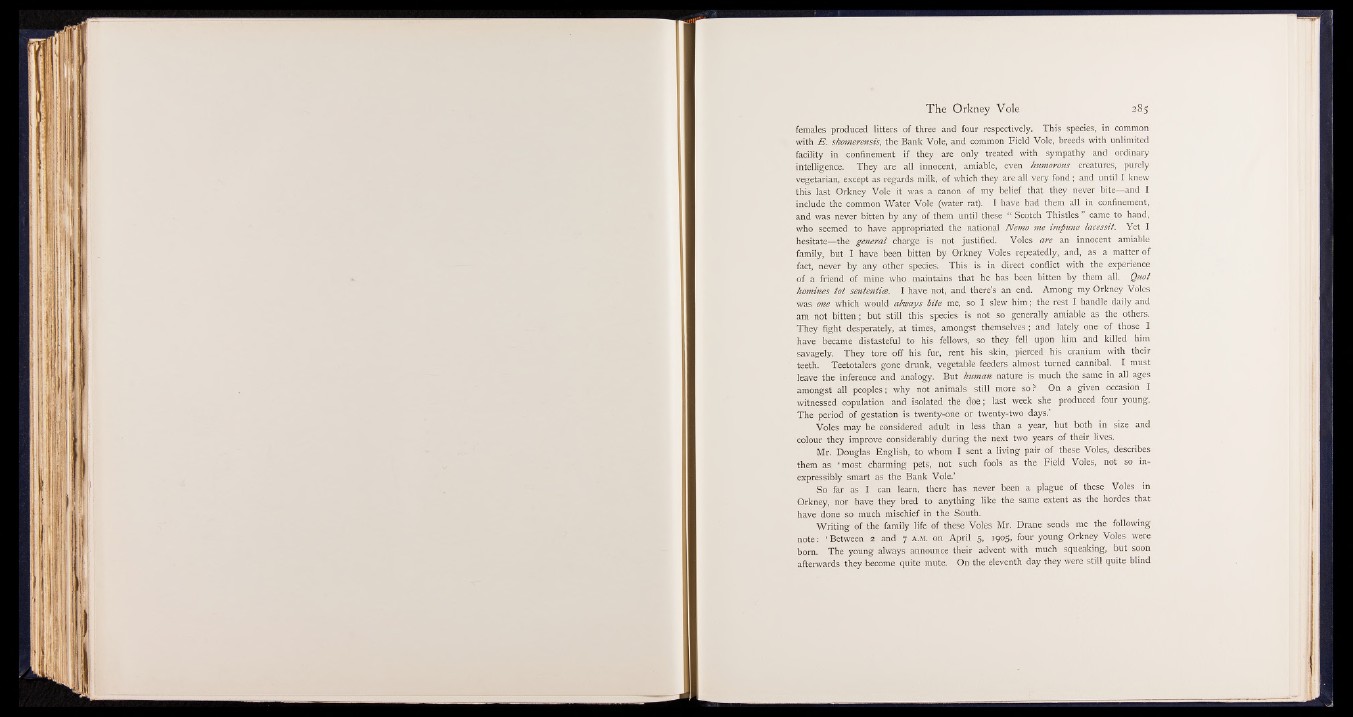
females produced litters of three and four respectively. This species, in common
with E . skomerensis, the Bank Vole, and common Field Vole, breeds with unlimited
facility in confinement if they are only treated with sympathy and ordinary
intelligence. They are all innocent, amiable, even humorous creatures, purely
vegetarian, except as regards milk, of which they are all very fond ; and until I knew
this last Orkney Vole it was a canon of my belief that they never bite—and I
include the common Water Vole (water rat). I have had them all in confinement,
and was never bitten by any of them until these “ Scptch Thistles ” came to hand,
who seemed to have appropriated the national Nemo me imfiune lacessit. Yet I
hesitate—the general charge is not justified. Voles are an innocent amiable
family, but I have been bitten by Orkney Voles repeatedly, and, as a matter of
fact, never by any other species. This is in direct conflict with the experience
of a friend of mine who maintains that he has been bitten by them all. Quot
homines tot sent entice. I have not, and there’s an end. Among my Orkney Voles
was one which would always bite me, spy I slew him; the rest I handle daily and
am not bitten; but still this species is not so generally amiable as the others.
They fight desperately, at times, amongst themselves; and lately one of those I
have became distasteful to his fellows, so they fell upon him and killed him
savagely. They tore off his fur, rent his skin, pierced his cranium with their
teeth. Teetotalers gone drunk, vegetable feeders almost turned cannibal. I must
leave the inference and analogy. But human nature is much the same in all ages
amongst all peoples; why not animals still more so ? On a given occasion I
witnessed copulation and isolated the doe; last week she produced four young.
The period of gestation is twenty-one or twenty-two days.’
Voles may be considered adult in less than a year, but both in size and
colour they improve considerably during the next two years of their lives.
Mr. Douglas English, to whom I sent a living pair of these Voles, describes
them as ‘ most charming pets, not such fools as the Field Voles, not so inexpressibly
smart as the Bank Vole.’
So far as I can learn, there has never been a plague of these Voles in
Orkney, nor have they bred to anything like the same extent as the hordes that
have done so much mischief in the South.
Writing of the family life of these Voles Mr. Drane sends me the following
note: ‘ Between 2 and 7 a.m. on April 5, 1905, four young Orkney Voles were
born. The young always announce their advent with much squeaking, but soon
afterwards they become quite mute. On the eleventh day they were still quite blind